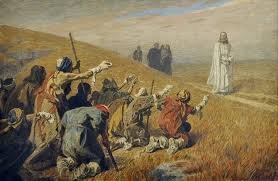TWENTY-EIGHTH SUNDAY IN ORDINARY TIME
(Green) Cycle C/Year II (October 9, 2016)
2 Kgs 5:14-17/2 Tim 2:8-13/ Lk 17: 11-19
Journeying to Jerusalem, Jesus travelled through Samaria and Galilee. In a village, He was met by ten lepers asking Him for His mercy. The merciful Lord immediately cured them by telling them to go and show themselves to the priests who would be the ones to declare that indeed they were cured. Upon learning that they were all cured, one went back to Jesus and glorifying God, thanked Jesus. Jesus then asked him the whereabouts of the other nine for they were ten who were healed. The only one who returned to thank Jesus was the Samaritan, while the nine were Jews.
The first thing that we notice here is that the Jews had no dealing with the Samaritans because they considered them as impure. But when this misfortune befell on them, they forgot their differences and they lived in community and in harmony. Barclay, a biblical exegete, says that a great law of life is that common misfortune breaks down the racial and national barriers. But then when the ten lepers were cured, again the barriers were back: the nine Jews were then separated from the Samaritan.
There exist different kinds of barriers in our society: economic, academic, racial, and national barriers to mention a few. Experiences tell us that indeed, when there is a common misfortune, these barriers collapse. What happened in Tacloban with typhoon Yolanda is a concrete example of this. Local, national and international help both coming from governments and non-governmental organizations arrived. They all forgot their differences to help the humanity suffering in Tacloban area.
The story of the ten lepers and the event in Tacloban must help us become aware of the fact that all of us are equal as human beings and that is the most important thing. We must not build barriers between us but rather, we must destroy them so as to be united as humanity. We belong to one race, the human race, and we must treat ourselves as brothers and sisters regardless of our color, ideologies, beliefs, economic condition, social status, educational background, etc.
The question of Jesus Christ to the Samaritan about where his companions were brings back to us the question of God to Cain: “Where is your brother Abel? (Gen 4:9)” With such question Jesus was merely telling us that we are all brothers and sisters in one God. But what happens is that we do not care for one another; we do not treat ourselves as brethren. Cain’s answer to God “Am I my brother’s keeper? (Gen 4:9)” shows our indifference to one another. We do not simply care for others because we are too selfish.
When Jesus healed the ten lepers, He did not want the barriers to be back. For this reason, He asked the Samaritan where the other nine were. What Jesus wants is that we may always see the blessings that we receive as instruments in becoming closer to one another. We need to share our blessing with others especially those who are in need. We are blessed and cured by God in order to care for one another because indeed we have become brothers and sisters to Jesus Christ in one God, our Father.

























